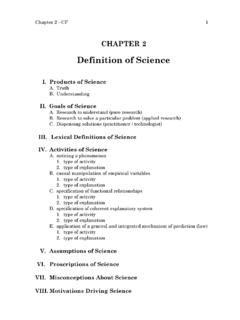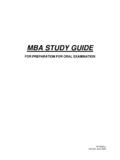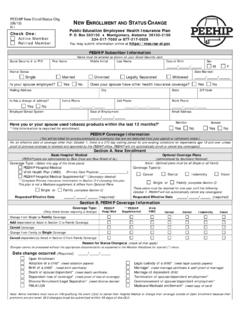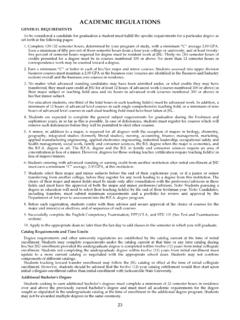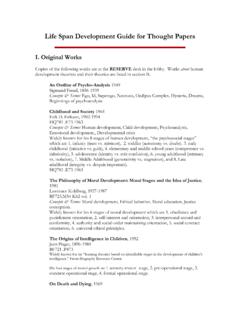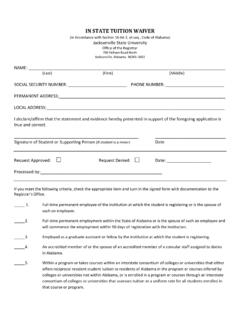Transcription of SUMMARY OF DEGREES AND GENERAL STUDIES …
1 42 SUMMARY OF DEGREES AND GENERAL STUDIES requirements jacksonville State university offers seven undergraduate DEGREES : Bachelor of Science in Education, Bachelor of Science, Bachelor of Arts, Bachelor of Fine Arts, Bachelor of Social Work, Bachelor of Science in Nursing, and Bachelor of Science in Respiratory Therapy. Students may be awarded multiple majors within a degree . Students seeking to earn additional bachelor s DEGREES must complete a minimum of 32 semester hours in residence over and above the previously earned bachelor s degree and must meet all academic requirements for the degree sought as stipulated in the undergraduate catalog at the time of enrollment in the additional degree program. The student must submit an updated application form to the appropriate dean s office for approval in advance.
2 Students may not be awarded multiple DEGREES in the same graduation exercise. The following SUMMARY of GENERAL STUDIES requirements must be included in all undergraduate DEGREES . These represent minimum requirements . Specific degree programs and majors may have additional requirements . GENERAL STUDIES CURRICULUM (60-64 SEMESTER HOURS) Area I-Written Composition (6 semester hours) Course Course Number Title EH 101 English Composition I EH 102 English Composition II EH 103 Honors English Composition I EH 104 Honors English Composition II Area II-Humanities and Fine Arts (12 semester hours) Major departments specify which courses are required. As part of the GENERAL STUDIES curriculum, students must complete a six-semester hour sequence in either literature or history. Course Course Number Title ART 202 Art Appreciation DR 242 Introduction to Theatre EH 141 Oral Communication EH 201 American Literature I EH 202 American Literature II EH 203 Survey of English Literature I EH 204 Survey of English Literature II EH 219 Honors Literature I EH 220 Honors Literature II EH 231 World Literature I EH 232 World Literature II FH 101 Beginner s French I FH 102 Beginner s French II FH 201 Intermediate French I FH 202 Intermediate French II GN 101 Beginner s German I GN 102 Beginner s German II GN 201 Intermediate German I GN 202 Intermediate German II MU 233 Introduction to Music SH 101 Beginner s Spanish I SH 102 Beginner s Spanish II SH 201 Intermediate Spanish I SH 202 Intermediate Spanish II Area III-Natural Sciences
3 And Mathematics (11 semester hours) Major departments specify which courses are required. Students must complete at least three semester hours in mathematics as required by major and at least eight semester hours in the natural sciences, which must include laboratory experiences. Course Course Number Title BY 101 and 103 Introductory Biology I and Lab BY 102 and 104 Introductory Biology II and Lab CY 105 and 107 GENERAL Chemistry I and Lab CY 106 and 108 GENERAL Chemistry II and Lab CY 115 Concepts of GENERAL Chemistry I CY 116 Concepts of GENERAL Chemistry II GL 241 and 243 Physical Geology and Lab 43 GL 242 and 244 Historical Geology and Lab GY 250 and 252 Physical Geography I and Lab GY 251 and 253 Physical Geography II and Lab MS 110 Finite Mathematics MS 112 Precalculus Algebra MS 113 Precalculus Trigonometry MS 115 Precalculus Algebra and Trigonometry MS 120 Calculus and Its Applications MS 125 Calculus I MS 126 Calculus II MS 227 Calculus III PHS 201 and 203 College Physics I and Lab PHS 202 and 204 College Physics II and Lab PHS 211 and 213 Physics for
4 Scientists and Engineers I and Lab PHS 212 and 214 Physics for Scientists and Engineers II and Lab PHS 271 Elements of Astronomy I PHS 272 Elements of Astronomy II Area IV-History, Social, and Behavioral Sciences (12 semester hours) Major departments specify which courses are required. (As part of the GENERAL STUDIES curriculum, students must complete a six-hour sequence either in literature or history.) Course Course Number Title AN 224 Introduction to Anthropology EC 221 Principles of Microeconomics EC 222 Principles of Macroeconomics GY 120 World Regional Geography GY 220 Human Geography HY 101 Western Civilization I HY 102 Western Civilization II HY 201 American History I HY 202 American History II PSC 100 Introduction to American Government PSY 201 Principles of Psychology PSY 222 Human Development SY 221 Introduction to Sociology Area V-Pre-Professional, Major and Elective Courses (19-23 semester hours) Major departments specify required courses and/or electives.
5 MAJOR/MINOR requirements /ELECTIVES: Minimum 60-64 hours TOTAL: Minimum 120-132 hours Students are encouraged to incorporate internships and practical field experiences in their degree plans. These field experiences may or may not be credit-bearing, but are considered integral to the learning process. Students should consult their academic advisors for prior approval and guidance. BACHELOR OF ARTS Majors for the Bachelor of Arts ( ) DEGREES may be selected from any field in which majors are offered, with the exceptions of physical education, computer science, computer information systems, family and consumer sciences, criminal justice, accounting, management, marketing, mathematics, finance, education, social work, chemistry, emergency management, geography, psychology and teaching fields.
6 Minors may be selected from any fields in which minors are offered. Students may not take as a second (double) major a subject not permitted as a major in this degree . BACHELOR OF FINE ARTS The requirements for the Bachelor of Fine Arts ( ) are listed under the Department of Art. BACHELOR OF SCIENCE The requirements for the Bachelor of Science ( ) degree are the same as those for the Bachelor of Arts degree , with the following exceptions: 1. Where the degree is chemistry and the minor is biology or mathematics, a foreign language is highly recommended. However, the taking of a foreign language is encouraged in all programs. 2. Majors for the degree may be selected from the following fields: finance, biology, economics, family and consumer sciences, sports management and recreation STUDIES , exercise science and wellness, management, marketing, accounting, computer science, computer information systems, chemistry, emergency management, mathematics, geography, sociology, psychology, criminal justice, occupational safety and health management, applied manufacturing engineering, industrial leadership, and applied electronics engineering.
7 44 Students may not take as a second (double) major a subject not permitted as a major in this degree . BACHELOR OF SOCIAL WORK The requirements for the Bachelor of Social Work ( ) degree are listed under the Department of Sociology and Social Work. Specific GENERAL STUDIES requirements and social work requirements are detailed. Double majors are not allowed in the degree . BACHELOR OF SCIENCE IN EDUCATION The requirements for various DEGREES in education vary considerably. See the section entitled School of Education for the requirements of DEGREES in early childhood education, elementary education, family and consumer science education, secondary education, physical education and collaborative education. Information regarding teaching fields may be found under the respective department or school. BACHELOR OF SCIENCE IN NURSING The requirements for the Bachelor of Science in Nursing ( ) are listed in the section entitled Department of Nursing and Respiratory Therapy.
8 Programs of study are listed for both GENERAL students and licensed registered nurses seeking degree completion. BACHELOR OF SCIENCE IN RESPIRATORY THERAPY The requirements for the Bachelor of Science in Respiratory Therapy ( ) are listed in the section entitled Department of Nursing and Respiratory Therapy. Programs of study are listed for both GENERAL students and practicing respiratory therapists seeking degree completion. PRE-ENGINEERING Students entering pre-engineering will consult their engineering advisor and the program outlined under the Department of Applied Engineering. PRE-HEALTH PROFESSIONS jacksonville State university provides the necessary academic experience for students who plan to seek admission to a health professional school in medicine, dentistry, optometry, physical therapy, pharmacy, veterinary medicine, physician assistant, etc.
9 In most instances, students are expected to have completed a four-year program of study leading to a baccalaureate degree . While a specific major is not required for the health professions, most students who successfully matriculate in a health professional school, including medical school, have elected a major in biology or chemistry. Admission to a health professional school will require successful performance on the appropriate entrance examination (the MCAT, DAT, VAT, OAT, etc.), a GPA of or higher that has been achieved through a rigorous program of study, and a successful personal interview. These achievements are usually preceded by a serious dedication to academic STUDIES and a high degree of competitiveness achieved through activities that demonstrate critical thinking and problem-solving skills, such as undergraduate research.
10 Students must be well prepared prior to seeking admission; in GENERAL , this means a basic working knowledge of biology (17 semester hours or more), chemistry (16 semester hours or more), and often physics (eight semester hours or more). Advanced course work in biology and/or chemistry is highly recommended. Admission requirements to specific schools and programs vary; therefore, students considering health profession careers must seek advice from one of the pre-health professional advisors very early in the course of study. Students should plan individual academic programs carefully, taking the specific courses required for admission to the health professional schools and programs to which they plan to apply. To ensure a successful and positive academic experience, students should work closely with the pre-health professional advisors.
